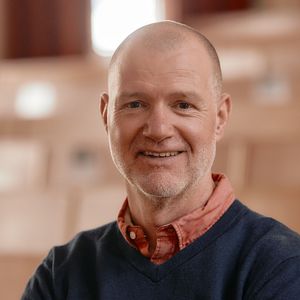Infection Biology and Control - Master
Key data on study program
Faculty
Medicine
Academic Degree
Master
Restricted admission
Yes, in first semester
Regular duration of studies
4 semester
Is a combination subject required?
No
Application deadline
for
non-EU citizens
Winter semester:
15.07
Valid for all applicants with German or EU university entrance qualification.
Program start
Winter semester
Language of instruction
English
Costs
Tuition and other fees
Requirements and application
The Master's program Infection Biology and Control started in the winter semester 2023/24 and is only open to non-EU citizens. It takes place entirely at the campus of the Centre de Recherches Médicales de Lambaréné (CERMEL) in Gabon. Every two years, 20 study places are available and will be awarded according to the applicant’s qualifications and experiences. Students can receive a monthly DAAD scholarship.
The application deadline is 15 July. To be admitted to the Master’s program, applicants must either have completed a Bachelor’s Degree or will complete their Bachelor's Degree before starting the Master's program.
The selection process consists of two stages, a pre-selection and a selection interview.
Application and admission take place via the central administration office of the university.
The Master's program Infection Biology and Control is only open to non-EU citizens.
Application requirements
The application must be made using the form provided by the University of Tübingen (online portal). The application form must be accompanied by (uploaded documents):
- A Bachelor’s degree of at least six semesters of study in Biology, or in an equivalent degree in a comparable subject with a grade of 3.0 or better (German grading system).
- English language skills at B2 level CEFR (Common European Framework of Reference for Languages).
- Documentation of French proficiency of at least level of A2 CEFR (DELF A2).
- Documentation of the contents of the completed study program.
- If available, evidence of special achievements and e.g. laboratory internships and/or relevant (research) activities.
Important information for all documents
You can only hand in documents written in German, English or French. Documents in all other languages have to be accompanied by a translation into German, English or French by a sworn-in translator. Please always load up or present both - your original documents and their translations.
English language skills
English language skills at the B2 level must be verified by one of the following language certificates:
- TOEFL (IBT) with a minimum score of 79 or an equivalent exam as determined by TS/TOEFL with a corresponding score
- IELTS with at least level 6.5; Cambridge Certificate FCE, CAE, CPE with completed level B2 or higher
- a recognized university entrance qualification obtained in English and in a country whose first official language is English or obtained in a sovereign capacity of one of these countries
- a recognized university degree of at least three years duration, taken entirely in English; or a German “Hochschulzugangsberechtigung” with English as a subject of instruction from at least grade 8 up to the senior class with a final grade of "good".
The Infection Biology and Control program is conducted entirely in English. You will need to have knowledge of the English language at the B2 level in the Common European Framework of Reference for Languages and prove this when applying for a study place (see application requirements). Since the study program will take place at the campus of the Centre de Recherches Médicales de Lambaréné (CERMEL) in francophone Gabon, A2-level proficiency in French is expected (see application requirements). You do not need to know German to be able to study the Master in Infection Biology and Control.
Program details
Infection Biology aims at characterizing the interaction between pathogens and their hosts with the aim of elucidating the mechanisms through which parasites, bacteria, viruses, and fungi invade their hosts and cause diseases. Infectious diseases contribute to great proportion of illnesses and death worldwide. Understanding how pathogens get access to their host, colonise and cause disease is an important step towards developing strategies for control. Sub-Saharan Africa has one of the highest burdens of infectious diseases world-wide.
The Master’s program in Infection Biology and Control is fully focused on the predominant causes of the infectious diseases burden in sub-Saharan African countries, e.g., major parasitic pathogens and emerging and re-emerging viruses with an added emphasis on translational aspects of infectious disease control in the Central African context. To successfully control infectious diseases, the underlying molecular, immunological, and epidemiological mechanisms first need to be better understood. The aim of this program is to equip young students with the knowledge and skills necessary to tackle biological and medical challenges. These include the timely identification of emerging drug resistance for many neglected parasites using novel tools in genomics, molecular biology such as the use of environmental DNA techniques for vector research and not least, urgent one-health related research questions.
The Master's program in Infection Biology and Control is a consecutive, research-oriented programme, which leads to a Master of Science (M. Sc.) degree. The program is offered by the Faculty of Medicine and the Institute of Tropical Medicine. The place of study will be the Cermel in Lambaréné, Gabon.
The number of students is limited to 20; therefore, small group work is possible in all modules. The programme is characterized by the following crucial features:
- International exchange & networking
- Research-orientation
- Mentorship. You will receive support and advice throughout the program by your individual mentor with whom you will be paired at the beginning of the program. They will guide your personal and professional development throughout your studies and provide support for the successful completion of the program.
- Master's Thesis. In the fourth semester students will work on a six-month Master's Thesis. In addition to laboratories at the University of Tübingen and at the Cermel in Lambaréné, laboratories are also available in Berlin, Heidelberg, Libreville or partner institutes of the Institut Pasteur in Africa.
The Master's program in Infection Biology and Control is a DAAD-funded program within the framework of CAIDERA (Central African Infectious Disease and Epidemics Research Alliance).
A large number of cooperations make this degree program possible. The most important cooperation partner for the University of Tübingen is the CERMEL (Centre de Recherches Médicales de Lambaréné). The University of Tübingen and in particular the Institute of Tropical Medicine have been working together with the CERMEL for many years. The CERMEL will provide the campus for the students of the Master Infection Biology and Control.
If you are an EU citizen and you are interested in emerging infectious diseases, then you can apply to our partner program (EUR) "One Health in Emerging Infectious Diseases" (1H-EID) in France.


The program lasts four semesters and comprises a total of 120 ECTS.
Please consult the Module handbook for an extensive description of the program and its modules.
The Infection Biology and Control degree program is already taking place full-time in Lambaréné, Gabon. In principle, it is also possible to apply for stays abroad in all degree programs at the University of Tübingen, but we advise students of the Master's program in Infection Biology and Control against this as this DAAD-funded degree program already has a very fixed study program and modules cannot be offered in every semester. Please consult the "Weekly Timetables" in the Module Handbook of the program for further information.
Optional time abroad
You may choose to spend some time abroad as part of any study program. You should start planning it 12 to 18 months before your departure.
Here you will find general information and advice on studying abroad. In addition, some departments have their own subject-specific services providing information on studying abroad.
| 4-semester full-time study | 400 euros stipend monthly | 20 study places | location of study: Lambaréné, Gabon |
The module handbook describes the goals and the structure of a degree program. In the module handbook you will find details of the types of modules offered and their respective workloads as well as the requirements and assessments. Since the program is designed almost entirely in block formats and many lecturers travel to Gabon especially for these block seminars, the module handbook also contains "Weekly Timetables", overviews showing the course distribution over each of the four semesters. The module handbook and the exam regulations help you to understand the framework and conditions of your program. The module handbook displayed here is subject to the approval of the examination regulations for the degree program Infection Biology and Control.
The exam regulations contain the legally binding regulations for a degree program. They set out, for instance, which modules must be taken and which assessment must be completed in order to successfully complete the degree program. The exam regulations also regulate how often exams may be repeated, which deadlines apply to assessment, and how the final grade is calculated. The exam regulations and the module handbook help you to understand the framework and conditions of your program.
Masterrahmenprüfungsordnung (General Provisions of the University of Tübingen exam regulations for Master’s degree programs) - English version (not legally binding)
Help with choosing a study program
Help with your decision to study in Tübingen:
To help you decide whether Tübingen is right for you, here are some contact points and information on studying in Germany:
University of Tübingen
- University of Tübingen’s international profile
- Contact: University office for the Advising and Admission of International Students
- Information on application for international students
- FAQs for international students
- Addresses and contact points for international students at the University of Tübingen
General information
 © Beate Armbruster
© Beate Armbruster
We aim to equip the next generation of African based scientists with both the knowledge and the skills needed to tackle the enormous current and future infectious diseases challenges in interdisciplinary, collaborative research environments.
Prof. Dr. Steffen Borrmann, Program Director
After your studies
A Master’s Degree in Infection Biology and Control opens a variety of paths to pursue. It gives the opportunity to graduates to work in various health related professional fields. Career options could include working at:
- National and international disease control programs (e.g., Africa CDC, WHO)
- Pharmaceutical companies (e.g., Public Health Scientist)
- Universities and research institutes (e.g., Lecturer, Researcher)
- Non-governmental organizations (e.g., CARE, MSF).
The program also provides a solid foundation for PhD studies.
Advice and internships
The University’s Career Service assists with careers orientation and getting started in your profession. Jobs and internships can be found in the Praxisportal.
Upon successful completion of the Master’s program Infection Biology and Control, graduates may directly pursue a doctorate or PhD.

